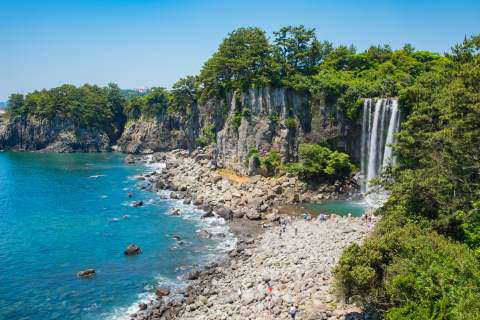Traveling in Cheju (Jeju)
 Waterfall on Jeju-do, South Korea
Waterfall on Jeju-do, South Korea
Cheju is an island located just off the southern coast of South Korea in the Korean Strait. It is known for its volcanic landscape full of craters and cave-like lava tubes, which many visitors venture to hike and explore. With the main industry invested in tourism, it is a popular vacation spot for Koreans and foreigners alike, and remains the top honeymoon destination for Korean newlyweds.
Neighborhoods & Around
Jeju city is the capital city of the province and usually the first and last stop for tourists due to its hosting of the Jeju International Airport and main ferry terminal. The city centre, just east of the airport, has a few historic structures, plenty of shopping, and lively bars opposite the old City Hall. Tapdong-ro has a plethora of seafood and pork restaurants, and the coastal road starting at Yongduam Rock has nice seaside views and many more restaurants, cafes, bars. Seogwipo is the other main city, occupying the south half of the island. Spread out along the coastline, Seogwipo is home to the Jeju International Convention Centre, Jungmun Tourist Resort Complex, 2002 FIFA World Cup Stadium, a port, beaches, and upscale hotels. The landscape consists of sheer cliffs, dark caves, and beautiful waterfalls.
Related:
Traveling alone to Seoul or Tokyo? Are you a student looking for a hostel in South Korea? Find the best hostels throughout South Korea.

 Budget Your Trip is all about finding out how much everything costs so that you can travel cheaper and longer. Created by avid travelers Laurie and Bryan, our goal is to help you plan your next trip on the right budget. With average daily travel costs that are calculated from the budgets of real travelers, plus an analysis of hotel and tour prices, you can find out how much money you need to plan your next adventure. We also have plenty of travel advice, accommodation reviews, and activity suggestions.
Budget Your Trip is all about finding out how much everything costs so that you can travel cheaper and longer. Created by avid travelers Laurie and Bryan, our goal is to help you plan your next trip on the right budget. With average daily travel costs that are calculated from the budgets of real travelers, plus an analysis of hotel and tour prices, you can find out how much money you need to plan your next adventure. We also have plenty of travel advice, accommodation reviews, and activity suggestions.